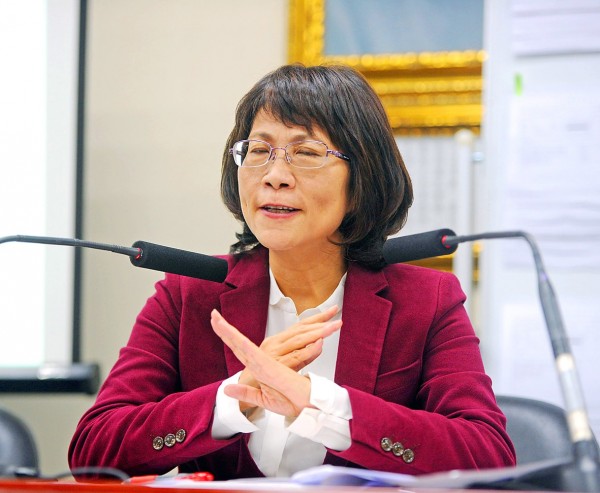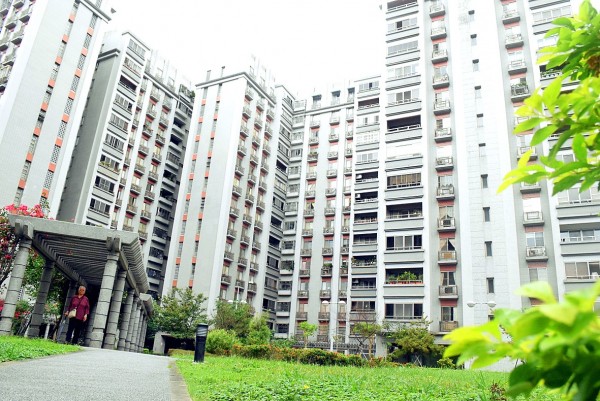《TAIPEI TIMES 焦點》Wang vows to donate property earnings

Chinese Nationalist Party (KMT) vice presidential candidate Jennifer Wang gestures during a press conference at KMT headquarters in Taipei yesterday to explain her property deals involving military housing units. Photo: CNA
MILITARY HOUSING: The KMT vice presidential candidate said her family owns only three houses, but that she had purchased nine properties between 1995 and 2003
By Stacy Hsu / Staff reporter
Chinese Nationalist Party (KMT) vice presidential candidate Jennifer Wang (王如玄) yesterday pledged to donate all profits she has made from sales of military housing units, amid mounting pressure for her to provide the public with a clear explanation of the controversy.
Against the background of two large boards covered with property declaration documents that she and her husband have filed since 1993, Wang said she decided to hold a press conference in Taipei to clear up the matter after seeing KMT supporters confused or misled by “unsubstantiated allegations” leveled by the Democratic Progressive Party (DPP).
“Even now, some people still mistakenly believe that I own 19 military apartments, or that I have made NT$300 million [US$9.08 million] in profits from selling military apartments,” Wang said.
She said her family currently owns only three military housing units, with one each registered under the names of her husband, mother and sister.
However, she added that she had purchased a total of nine military apartments between 1995 and 2003, seven of which were bought for investment purposes and two for self-occupation.
“All the property transactions were reported to relevant authorities in accordance with sunshine laws,” Wang said, adding that she was willing to subject herself to public scrutiny.
According to information provided by Wang, the seven investment properties included two units in the Ren Ai Xin Cheng (仁愛新城) residential complex in Taipei’s Zhongzheng District (中正), which were sold in 1997 and 2000, and generated a profit of NT$660,000 and NT$6.31 million respectively; and one unit in the Shi Mao Xin Cheng (世貿新城) complex in Taipei’s Xinyi District (信義), sold in 2003 for a profit of NT$700,000.
They also included one unit in the Jian Jun Xin Cheng (健軍新城) complex in Taipei’s Zhongzheng District, sold in 2002 for a NT$1.5 million profit; one unit in the Dun Hua Xin Cheng (敦化新城) complex in Taipei’s Songshan District (松山), sold in 2003 for a NT$3.63 million profit; and two units in the Da Peng Xin Cheng (大鵬新城) complex in New Taipei City’s Sindian District (新店), both sold in 2000 for a profit of NT$600,000 and NT$400,000 respectively.
The two self-occupied units were part of the Da Peng Xin Cheng complex, which were combined into a single unit and where Wang and her husband had lived for six years since their respective acquisitions in 1998 and 2000. The properties were resold in 2007 for a profit of NT$7.4 million.
Wang said she would donate the combined profit of NT$13.8 million she made from sales of the seven investment properties.
However, since the money she gained from the two self-occupied apartments were later used to purchase a military housing unit in the Jian Hua Xin Cheng (健華新城) complex in New Taipei City’s Banciao District (板橋) — which is currently registered under the name of Wang’s husband and meant to serve as their home after retirement — the NT$7.4 million profit was not an investment gain and would not be given away, Wang said.
Wang, who served as minister of the Council of Labor Affairs from May 2008 to September 2012, previously only acknowledged having bought five government-subsidized military apartments, including the three units still owned by her family and the two self-occupied Da Peng Xin Cheng houses.
She had been reluctant to hold a press conference to answer reporters’ questions on the matter, until KMT presidential campaign manager Jason Hu (胡志強) said on Monday that the controversy had taken a toll on the KMT’s election prospects.
At the press conference, Wang, a lawyer, denied that some owners of the military apartments might have been forced to sell her their properties.
“None of them were coerced or deceived... If there are any military housing owners who have been tricked or bulldozed into selling their houses, or seen their rights and interests encroached upon, I am willing to offer my legal assistance,” Wang said.
Wang said she has been under tremendous pressure due to fears that her real-estate dealings might affect the KMT’s campaign, adding that she joined the election to help the disadvantaged and never thought she would be subjected to sustained mudslinging and character assassination.
She was overwhelmed with emotion as she talked about how the intense media coverage has caused her mother to suffer heart problems and depression.
“My mother and sister are afraid of going home because of the reporters stationed outside. Sometimes they just wander around outside for an entire day,” Wang said, begging the public to leave her family alone.
Wang reiterated that all her property dealings were legal, but apologized for causing an outcry and letting the presidential campaign drift away from what was really important.
Television show host and political commentator Cheng Hung-yi (鄭弘儀) raised four questions regarding Wang’s explanation later yesterday.
“First, Wang said before that the property deals involved only five military apartments. Why it is 12 units now?” Cheng asked.
“Second, who can prove that she only made NT$13.8 million in profits from the sales of the [seven] military houses?” Cheng asked.
“Third, is it difficult to visit a local tax bureau and apply for copies of the tax returns she filed [for public scrutiny]?” he said.
“Fourth, Wang was appointed a member of the Ministry of National Defense’s Legal Rights Protection Commission of the Republic of China Military Forces in 2005, but she still purchased a military housing unit that year. Did she feather her own nest? Or did she exploit her position for profits?” Cheng said.
新聞來源:TAIPEI TIMES

The Jian Hua Xin Cheng housing complex in New Taipei City’s Banciao District is pictured on Nov. 24. Photo: Chen Wei-tsung, Taipei Times













